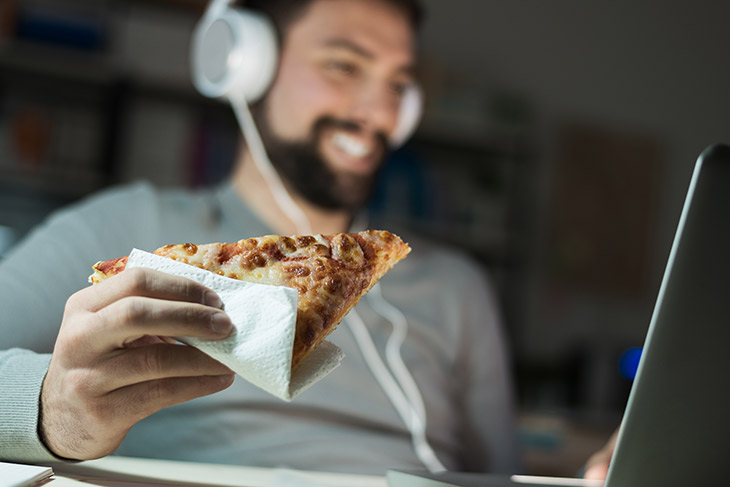5 food myths revealed

There are as many food myths around as there are fad diets so it’s no wonder people get confused about what a healthy diet actually looks like. Some of the most enduring nutrition myths concern what time of day you should eat your meals.
Can I eat carbs at night? Should I eat before I exercise? Will I gain weight if I have dinner after 8pm? We ask the experts to help us separate fact from fiction on some popular meal-time myths.
Myth 1: Don’t eat dinner too late
TRUE
Everyone’s busy all the time, that’s just a fact of modern life. We work late, our kids have a million after-school activities and the housework just keeps accumulating. With all that though, it is important to stick to a set meal schedule.
Eating very late at night has been a pattern associated with obesity. While there is no ‘best’ dinner time, the key is to try to keep to a similar pattern of meal times and not to eat too late at night. Whatever time you eat is, eat to your appetite, which means eating when you have a good level of hunger and stop before you’re full.
“Late night eating has been linked to greater kilojoule intakes which can promote excess weight gain. This is partly because the ability of food to satisfy appetite is less effective later in the day,” says Professor Manny Noakes.
If you can’t avoid eating later, plan your meal ahead of time and stick to the assigned portion. Eat slowly and ensure you have included plenty of vegetables as part of the meal.
According to Professor Manny Noakes, co-author of the CSIRO Total Wellbeing Diet books, portion-perfect meals for weight control should typically be higher in protein and low GI (or slow-digesting) carbohydrates. Examples of higher protein foods include lean red meat, chicken, eggs, tofu and fish.
Compare this to having a high carbohydrate meal with little protein - such as a bowl of pasta or takeaway pizza with garlic bread and a soft drink. It’s a recipe for gnawing hunger and an indulgent bedtime snack – unnecessary kilojoules that can be avoided if you’re eating balanced main meals throughout the day.
So try to keep to regular meal times, avoid eating very late at night if possible but always choose balanced high protein low GI meals.
Myth 2: It’s bad to eat before you go to bed
MOSTLY TRUE
According to a study published in the International Journal of Obesity, people who eat most of their food at night have higher body mass indexes than people who eat earlier in the day.
Again, this comes back to the types of foods you’re eating but also that’s it’s a lot harder to control food intake later in the day. Late night snacking is often more likely
convenient high-fat or high-sugar foods such as ice-cream or chips, which can contribute to weight gain in the long-term. A planned healthy snack after dinner is fine but if not, it can lead to a lot of extra kilojoules which is not helping your weight control.
“Regular meal timing trains our body clock and appetite control. We all have genes that regulate our body clock, our food intake and fat gain. The disruption of body clock through disordered eating can lead to health problems as well as obesity," says professor Noakes.
Myth 3: You have to eat breakfast
TRUE
Most people know that skipping on breakfast isn’t ideal – it can cause your hunger to build up and before lunch you’re most likely starving, causing you to eat more than you should. Keeping up this pattern can lead to weight gain in the long term, according to Professor Jennie Brand-Miller, Director of the Glycemic Index Foundation.
“If you avoid breakfast, not only will your hunger increase, but you’ll naturally choose high energy dense foods and will eat more kilojoules over the course of a whole day,” she says, “And because your energy stores are so low, you’re less inclined to undertake exercise.”
According to a study published in the Journal of the American College of Nutrition, skipping breakfast is not an effective way to manage weight. Eating cereal (ready-to-eat or cooked cereal) or quick breads for breakfast is associated with significantly lower body mass index compared to skipping breakfast or eating meats and/or eggs for breakfast.
Eating breakfast is also strongly linked with a reduced risk of a spectrum of metabolic conditions, such as metabolic syndrome, hypertension and Type 2 diabetes, according to a study published in Diabetes Care.
Myth 4: You need to eat pre- and post-training meals
TRUE AND FALSE
For untrained individuals, consuming supplemental protein likely has no impact on lean mass and muscle strength during the initial weeks of resistance training. However, as the duration, frequency and volume of resistance training increase, protein supplementation may promote muscle volume increase and enhance gains in muscle strength in both untrained and trained individuals. Evidence also suggests that protein supplementation may accelerate gains in both aerobic and anaerobic power.
The most important post-exercise habit is to rehydrate with water. A recovery snack after training, however, can help to refuel and repair our bodies and muscles and support our immune system. Dairy foods like reduced-fat milk or yoghurt are a good combination of protein and low GI carbohydrate suitable either before or after exercise.
Myth 5: You can’t eat carbs at night
TRUE AND FALSE
Cutting your carbohydrate foods with dinner can be a simple way of reducing your overall daily kilojoules. Recent studies also show that having carbohydrates late at night (11pm vs 6pm) resulted in different responses to breakfast next morning. Late night carbohydrate resulted in higher blood sugar responses to breakfast. This may not be a healthy outcome for people at risk of type 2 diabetes..
Eating large amounts of kilojoules overall at late evening meals also seems to be associated with weight gain. Make sure that you are not excessively hungry before evening meals by having a good lunch. Choose low-GI foods that are digested slowly and control the amount of insulin released in your body. Eating low GI carbohydrates with lean protein will keep you fuller for longer; the same type of meals the Total Wellbeing Being diet offers. Legumes, such as chickpeas, beans and lentils, have low GIs as well as fibre and protein.
According to Professor Brand-Miller, it’s best not to overeat in the evening as more often than not it is their most sedentary time of day - excess energy will only be stored in the body if it is not used.
Steer away from processed foods and heavy starchy carbohydrate dishes such as creamy pasta and chips. Have a good supply of salad or cooked vegetables or a vegetable soup to fill you up without the extra kilojoules.
